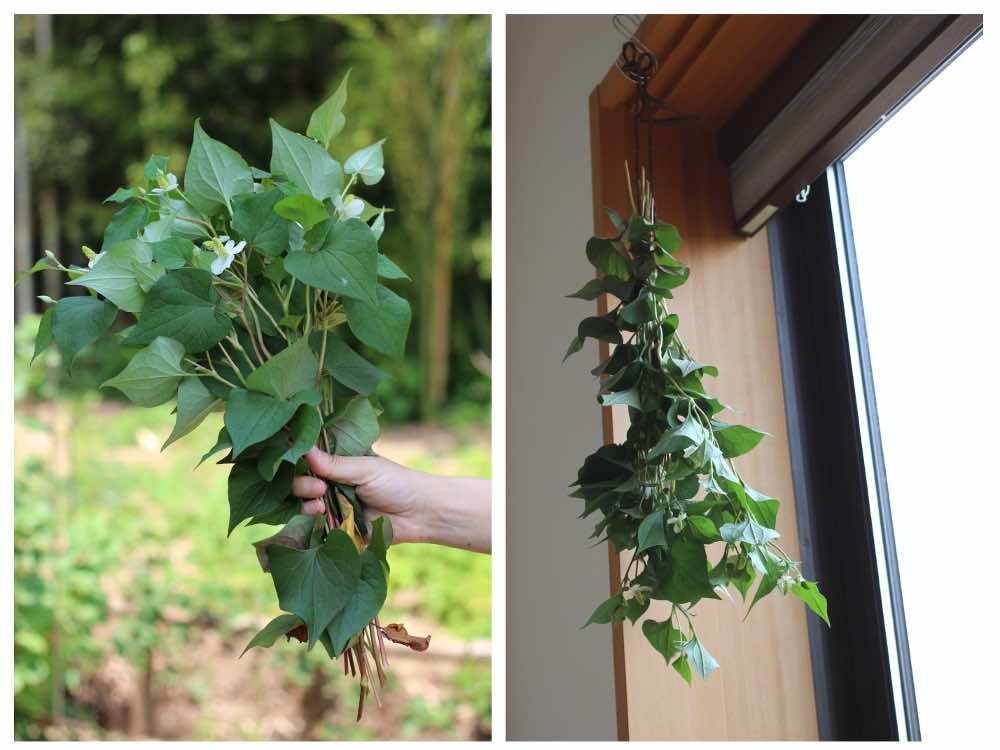Dokudami, Knot Hotel, Yuzushu
Dokudami
Dokudami, or the scientific name: Houttuynia cordata. A native of South Asia, Dokudami is found in Japan, China and Southeast Asia. Its scientific name, Houttuynia, comes from the name of a Dutch doctor, and cordata means "heart-shaped" in Latin. Some people find this flower has a particularly strong odor and many people find this flower unpleasant. However if you grew up with this smell it is not unplesent.
It begins to bloom in the middle of May and the lovely white flower tells the arrival of the rainy season coming up soon. It is said that Dokudami in bloom is at the best time of harvesting to make herb tea.
After weeding out Dokudami plants, you can make the best use of them by washing out and hang dry in shade. Thankfully, the fishy smell will be gone once they get dry completely. The dried Dokudami leaves can be used to make tea, location etc. It says Dokudami is a detox herb, and Dokudami tea in package and Dokudami location in bottles are often sold at drug stores in Japan.
Fresh leaves of Dokudami is also eatable, but you might find that the Dokudami growing in Japan has a too much strong smell to eat.
Another advantage is that Dokudami is good for burns. If you get a burn wound, wash clean a leaf of Dokudami and knead to juice, then put it on the burn wound that will help relieve the pain.
Since long ago, Dokudami's crude drugs (or herbal medicines) have been popularly used for healing wounds. They are like superstars in the world of Japanese herbal medicine as well as Chinese and Korean medicine. Dokudami's crude drugs work well after being rubbed with salt, or being crushed and rubbed. When they are applied on insect bites and cuts as well as purulent portions, they work very effectively.
The whole plant is dried and brewed, and used for treatments such as diuretics, antipyretics, pus removal, detoxication, swelling, hypertension, pulmonary tuberculosis, constipation, colds, and paranasal sinusitis.
Folk medicine: There are the so-called old wives' tales that had been passed on during the days when people had no special medical knowledge or information. People learned from experience, the effects and benefits of Dokudami, an item that was readily available. Simple treatment methods, such as rubbing fresh Dokudami leaves and filling them in the nose to improve nasal congestion, have been handed down in various parts of Japan.
Since the old days, people often used Dokudami as folk medicine. The current name, meaning "accumulating poison" in Japanese, prevailed after the 17th or the 18th century.
We are very happy when we see dokudami blooming because it is such a handy herb for mosquito bites, bug bites, scratches and is very nice as a detoxifying tea and it is a magical cleaner of poisons and toxins. We highly recommend adding this herb into your life. You can find this tea in most Asian stores and drugstores and online as well!
The Knot Hotel:
If you visit Japan, please check out the Knot Hotel in Shinjuku. The first and second floors are an open area where guests can eat, work, relax, play or just admire the artwork on the walls.
Tastefully furnished with vintage and custom-made chairs and sofas, these floors form a single, expansive space that unites the restaurant, bar, lounge and lobby. It is also in front of Shinjuku park and it’s always nice to be in that area.
This space is also open to the public. Many people like to come for dinner or drinks and there are always interesting exhibitions. Guests could also rent, “Tokyo Bike” a wonderful brand of city bikes. However due to corona virus, this service has been temporarily suspended.
4-31-1 Nishi Shinjuku, Shinjuku-ku, Tokyo
https://hotel-the-knot.jp/tokyoshinjuku/en/restaurants-bars/
Yuzushu
This unfiltered Yuzu liquor has become a real best seller over time. Very surprising like all the liqueurs of Asahara Shuzo, the Nigori Yuzushu has the special feature of leaving the palate fresh and clear, despite a very beautiful aromatic persistence. On citrus fruits, it has a beautiful acidity and liveliness.
Yuzu is a rare and highly popular citrus fruit in Japan. It has an irregular surface and its pot produce a very refreshing fragrance. For those who discover for the first time, this is a real surprise! The variety used by the brewery of Asahara is special because the skin of the fruits is thicker and thicker than the Yuzus in other areas. This liquor is to be enjoyed as an aperitif or a light digestive, fresh or on ice, and is a really interesting cocktail base.
Alcohol: 12.5%
Brewery: Asahara Shuzo (Saitama Prefecture)










